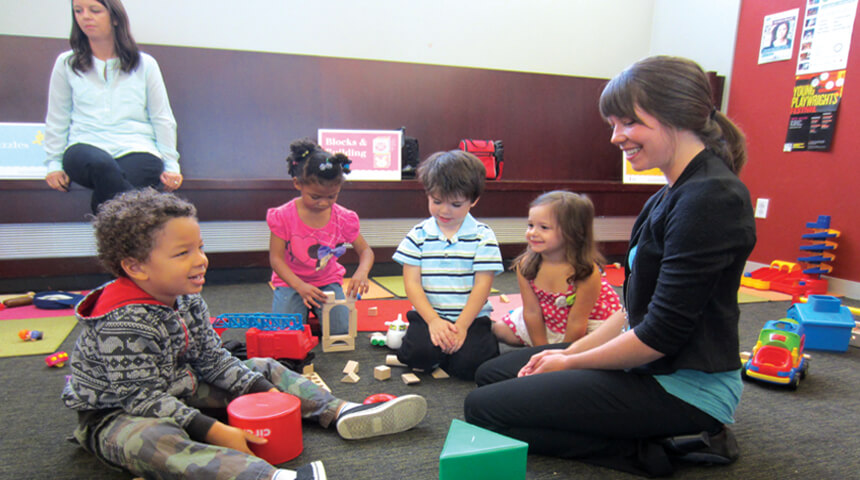The library is traditionally an institute that supports reading, literacy and learning. I am often asked why there are toys in the library and what playing has to do with reading. The simple answer is that PLAY supports literacy and learning; it is the conduit through which children develop both the ability and readiness to learn.
I am always amazed by how much a child can learn from play. According to NAEYC (National Association for the Education of Young Children) there are at least ten things children learn from playing with blocks. Children can learn problem-solving like figuring out how to make a tower taller or sturdier. Children may develop their imagination by building something out of their own creativity or by working with a friend to build something beyond their own imagination. They can learn measurement concepts like length, height or width. Or they can consider mathematical concepts of comparison, estimation, symmetry or balance. Blocks can help develop an understanding of spatial awareness, as well as develop both fine and gross motor skills. They can also allow a child to develop scientific reasoning by testing a hypothesis.
Block play can help children develop self-esteem and confidence when they successfully create, transform, tear-down and re-create their own unique building ideas. Most importantly, playing with blocks helps children with their social and emotional growth which is perhaps the single most important skill for school readiness. When children play with blocks they learn how to take turns, share, get along with others, navigate friendships and develop self-reliance.
PLAY is the work of childhood but often in our busy lives it is easy to forget the importance of play for children. Years of research has established that the time period from birth to age five is a vital period of brain development establishing many of the brain connections or “synapses” needed for a lifetime of learning. According to The Urban Child Institute article, Baby’s Brain Begins Now: Conception to Age 3, a baby’s brain “doubles in size in the first year, and by age three reaches 80 percent of its adult volume.” Every experience a child has in those first few years creates brain connections; each taste, smell, sound, touch, feeling or emotion starts the process of forming synapses.
Children in the early years need rich and full experiences that will build the synapse connections needed for both learning and social/emotional well-being. Perhaps not surprisingly, children learn best through the secure and loving relationships with their parents or caregivers. Children want and need to play and interact with the caring adults in their life.
Sadly, children do not come with instruction manuals, so as a parent it is often a challenge to know what to do to support our child’s learning development. Parents are their child’s first and most important teacher. Zero to Three, a website dedicated to supporting parents as they navigate through their child’s first three years of life provides multiple videos and informational pages to help parents learn what to do to support their child’s early learning. Their video about brain development suggests many “brain-building” activities parents can do with their children.
The library also seeks to support early learning by hosting programs that provide a dedicated time and space for parents and caregivers to play and explore with their child. Ten Carnegie Library of Pittsburgh locations: Allegheny, Brookline, East Liberty, Hill District, Homewood, Knoxville, Lawrenceville, Sheraden, West End and Woods Run, are Family Place Certified Libraries that host the Family PlayShop program.
When we treat children’s play as seriously as it deserves, we are helping them feel the joy that’s to be found in the creative spirit. It’s the things we play with and the people who help us play that make a great difference in our lives. ― Fred Rogers
Specifically created for children birth to age five with a parent or caregiver, Family PlayShop programs are essentially a playtime program. Twice a year for a four or five week series at each location, a room is filled with developmentally appropriate toys and activities. Community experts like doctors, speech therapists and dentists, are on hand to chat and ask questions about potty training, developmental milestones, health and more. Family PlayShop programs across the Carnegie Library of Pittsburgh system will happen in March, April and May. It is my hope that parents with young children can find a program on a day and time they are able to attend. I hope you will join us.

Jamie is the Children’s Specialist at CLP – West End. She is originally from the wilds of Idaho and grew up with a small menagerie of animals. Most memorably were the cats, dogs, rabbits, sheep, horses and one very temperamental goat. Of course, her favorite children’s stories feature animals doing rather silly things.
Join us for Family PlayShop!
Learn More
